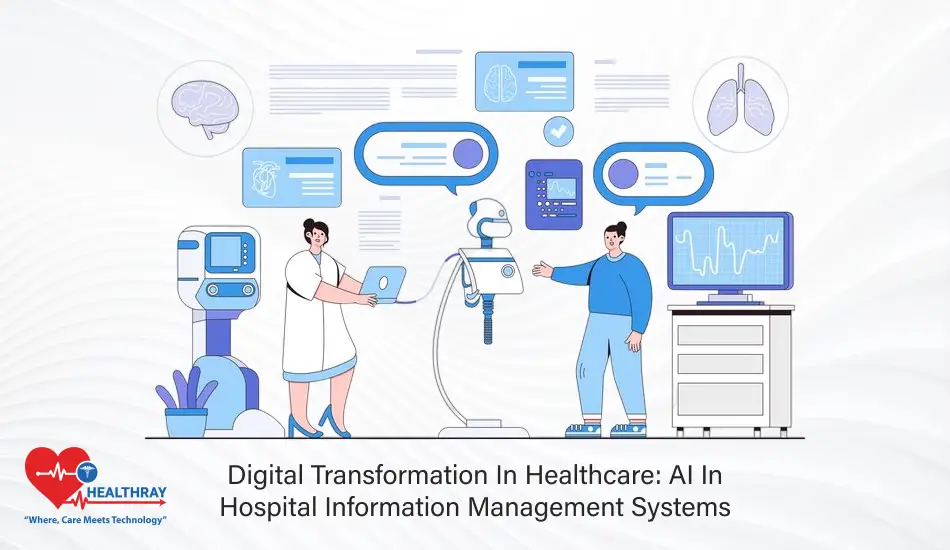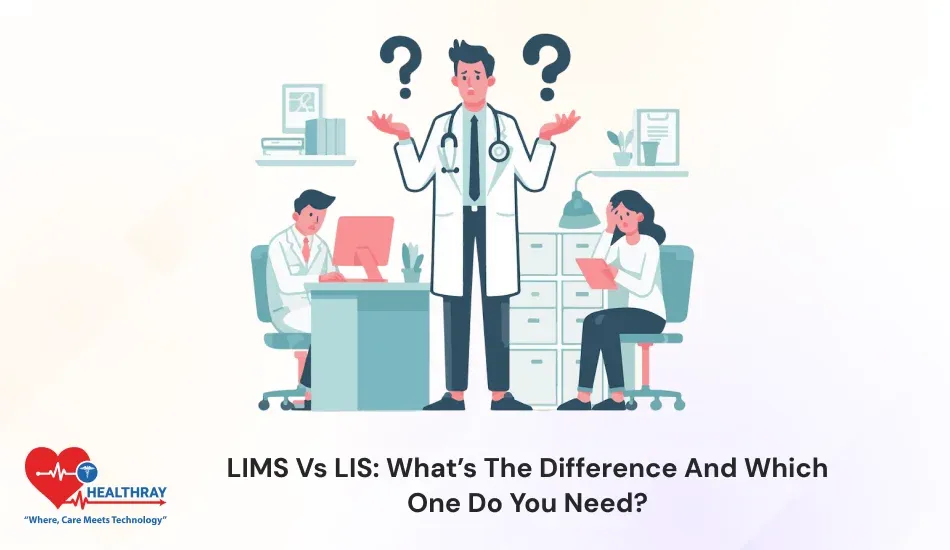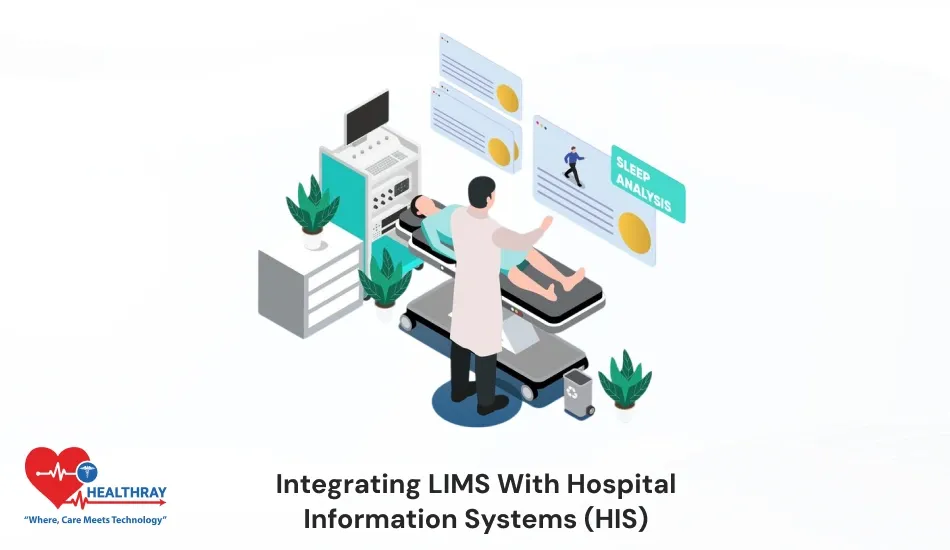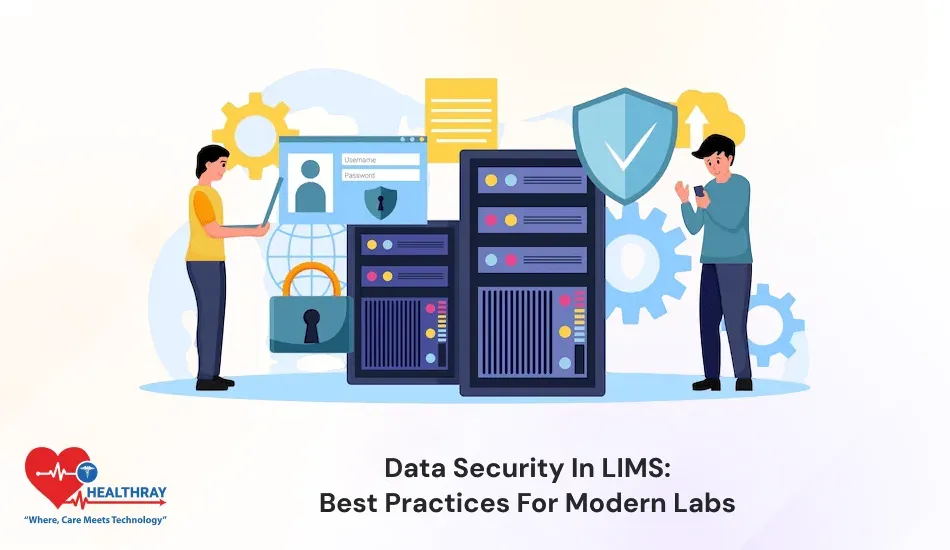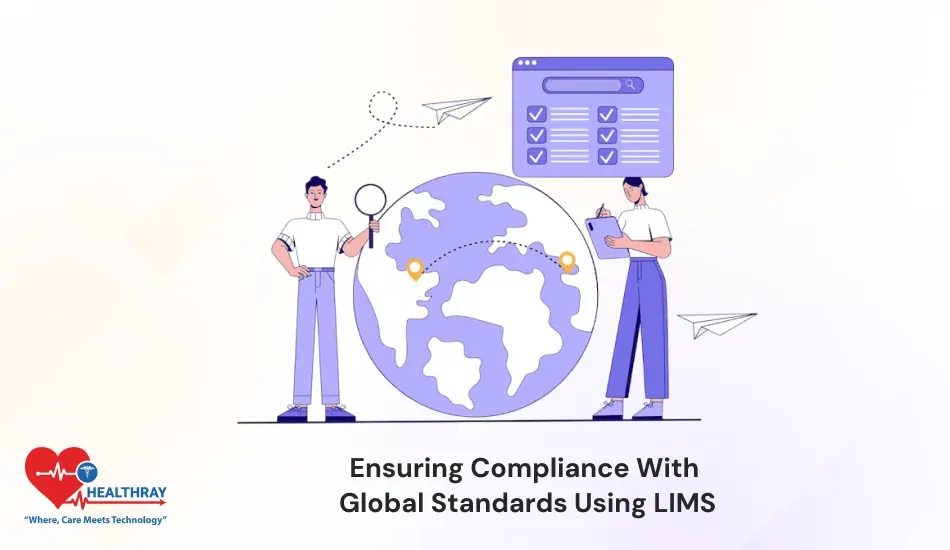This means that as a concept, a hospital is changing from a treatment site to becoming the bridge between technology and care, with Artificial Intelligence right in the middle of this. AI streamlines operations for better patient experiences by redefining the way information is handled in the hospital.
The potential of AI within the management system of any hospital is huge, and for its administrator, IT professional, and healthcare provider alike, difficult to overlook. This avenue leads to better workflow, better handling of data, and wiser decision-making. It’s not about adopting technology but creating seamless systems where people and AI work in tandem to deliver the best care possible.
How AI is Revolutionizing Hospital Information Management Systems? This blog goes deep into how AI will revolutionize hospital information systems, including benefits, challenges, and actionable insights to help you wade through this transition with assurance.
Improved Patient Care and Experience

AI has revolutionized the concept of delivering personalized and efficient care for patients. Among various features related to the hospital information system, one of the highlighting points is its quick analysis of large volumes of patient data. This would mean that health providers can make more informed decisions with no delay.
These AI tools leverage knowledge from the patient’s history, genetics, and lifestyle to determine a treatment plan for that patient. Think of having a system capable of forecasting health risks before symptoms show up. This will lead to an early approach for better patient outcomes and reduce the possibility of complications.
AI also fosters an improved patient experience on a day-to-day basis. With AI-driven real-time monitoring systems, it tracks vital signs and instantly raises alerts for health professionals. This reduces response times should critical situations arise and assures patients of being looked after during their stay.
Focusing on patient needs, streamlining how care is given, hospitals are setting a new standard in healthcare.
Operational Efficiency: Smoothening Healthcare Workflows
Managing a hospital is no small feat. Countless processes-from admitting patients, to staffing schedules, and inventories-must be run with seamless efficiency daily. This is where AI steps in, offering a variety of solutions for saving time and resources while minimizing human error.
Examples are AI-driven hospital information systems that automatically execute repetitive tasks. Instead of manually filling in the patient data on admission, AI can directly extract and input required information from the scanned documents. This increases speed while reducing manual errors.
Other major capabilities of AI include resource allocation. Bed availability, surgery scheduling, and even scheduling staff per shift are extremely common pain points for hospitals of all sizes. These patterns of patient flow and staffing needs, analyzed through AI algorithms, enable administrators to anticipate high-demand periods. This in turn means fewer bottlenecks, shorter wait times, and a generally better experience for everyone involved.
AI also optimizes supply chain management. Telesso assesses the trend in use and projects the needs in the future, making sure that essential supplies, including pharmaceuticals and surgical equipment, will always be there when needed without overstocking the inventory.
It’s not doing more with less; operational efficiency means creating that system whereby healthcare providers can focus on what they do best: taking care of patients, while technology handles all the complexities in the background.
Data Management and Security: Protecting Patient Information
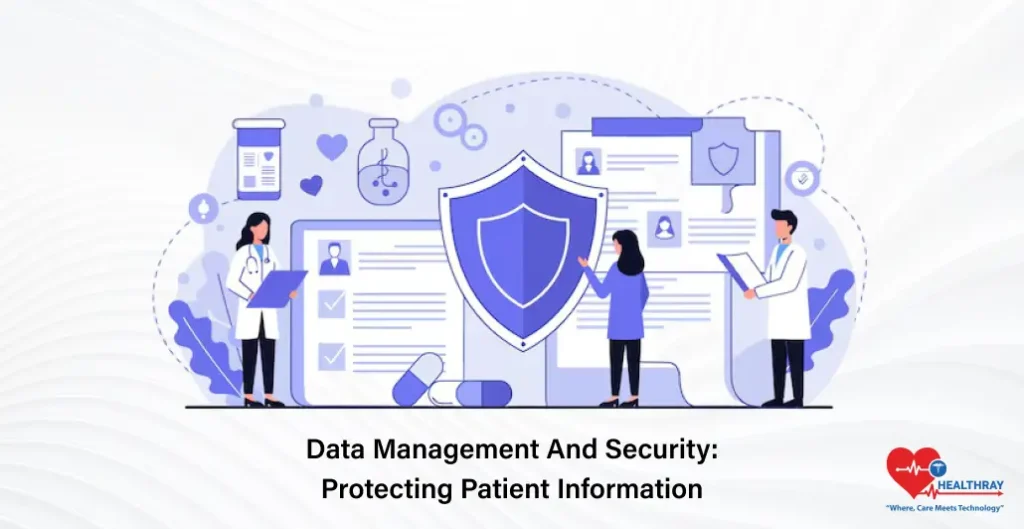
Right from the moment patients walk into the hospital, a huge amount of data is generated every day. From records and imaging results to billing information, this is one of the big challenges in healthcare-to keep information safe. AI is changing how the hospitals handle their data, making it organized and most importantly, secure.
The AI-powered hospital information system is capable of processing and analyzing big volumes of data in real time. It categorizes and stores data in such a fashion that retrieval becomes easy and quick, which is very helpful during emergencies. As an example, reducing the retrieval of a patient’s comprehensive medical history to a few clicks can shave off precious minutes in making life-and-death decisions.
But with great data comes great responsibility. Patient confidentiality is number one, and the AI systems are designed in such a way to strongly implement these security measures. Capable of detecting unusual patterns of access or breaches, they immediately take action to block unauthorized access. AI helps ensure compliance with data privacy regulations and thus provides peace of mind to both hospitals and patients.
Another strong advantage is predictive analytics. By monitoring its trends in data, AI can issue warnings on looming problems-such as the emergence of certain infections-so that the hospitals can implement the required precautions. Such proactive interactions raise the standard of care given, as well as create more trust between patients and providers.
One of the things a hospital should balance is accessibility and security and AI is what assures them that they can do so. Protecting the information and making it operational, these artificial intelligence systems will establish a new standard of health care information management.
Smarter Healthcare Decisions Decision Support System.
Health care is a matter of life and death, and correct and timely decisions can save lives. Nonetheless, as medical information grows more complicated each and every day, and the stress among health workers rises, one can easily ignore important details. This is where artificial intelligence-based decision support systems come in to be the trusted assistants to healthcare providers.
Such systems examine patient information in a manner some humans cannot: They scan through medical records, lab reports, and images and seek patterns and anomalies that are not obvious at first. To illustrate, AI may notify physicians about the development of complications due to the obvious patterns in the vital signs or laboratory tests of a patient.
Such systems also provide evidence-based recommendations and treatment plans are founded on the current medical guidelines. It is all in the best interest of the patient, and even everything starting with prescribing other drugs or locating less invasive approaches to surgery is all done with the assistance of AI.
Some of the aspects that AI is likely to introduce in the health provision sector include a decrease in diagnostic errors. Delay in diagnosis or misdiagnosis may be the crucial issue of concern to any healthcare environment. Using AI, symptoms, imaging data, and test data will be compared with big medical databases, therefore, reducing the list of possible diagnoses and making it more accurate.
Instead of eliminating human expertise, AI improves it. With the data-driven insights available just in time, the decision support system helps healthcare professionals to be able to focus on their patients with confidence that they will not miss any subtlety.
Issues and Problems: The adoption of AI in hospitals
Although AI has a significant potential, admittedly, implementation issues related to AI in a hospital information management system. Strict evaluation will be significant in the eyes of a hospital with a smooth progression and sustainability.
Interaction with Existing Systems.
Health institutions are forced to deal with old systems that may not be compatible with emerging AI options. The shift toward the AI-driven system should be planned well, so as not to interrupt the working process. The continuity of operations will highly require seamless integration.
Cost Implications and ROI
Implementation of AI technology is rather expensive at the very beginning. This is an ongoing process that includes purchasing hardware and software as well as updates to the software and hardware as it is an on-going process since updates demand repairs. This must be compensated against the ROI on the part of the hospital administrator. It can be worth the money to demonstrate to them how AI can help save money in the long-run, by minimizing errors, streamlining resources, and enhancing patient outcomes.
Data Privacy and Compliance
This is because AI systems demand vast volumes of patient data. This is now generating scrupulous data privacy and regulatory compliance issues. Thus, hospitals will have to introduce powerful solutions to preserve patient data and be governed by legislations such as HIPAA or GDPR. Once this is violated, then the trust would be propagated along the value chain.
Staff Training and Adoption
However, the implementation of AI needs to be accepted by the healthcare personnel-most of whom are likely unfamiliar or uneasy with AI. The most important aspect of the process is the training programs that make one and all aware of how to utilize the tools of AI and entrust the technology to support rather than to supersede their task.
Ethical Considerations
The algorithms used to make AI decisions may be biased to data it has been trained on and are at times biased. The hospitals should question the algorithms to ensure that the decision-making will be objective, transparent, and will be based on the core values of the patients.
These, however, will only be overcome through teamwork between the administrators, information technology specialists and the care providers. In case the hospitals can face these issues directly, AI can offer them some very incredible opportunities with the minimum interference.
Case Studies: The real world AI success stories in hospitals.
The practical implication of AI under the information management system of a hospital is realized when we actually get to the practical uses. I would like to present several examples by emphasizing how various hospitals managed to implement AI into their workflow and transform it in a way that would allow achieving higher patient outcomes.
Patient Care Predictive Analytics.
AI was introduced in patient-monitoring devices in one of the finest Singaporean hospitals.
Predictive analytics, therefore, helped to predict health complications, including sepsis, up to 24 hours in advance of symptoms becoming critical. Because of such early detection, healthcare providers could take effective action to ensure that ICU admissions were reduced by 20%, accompanied by improved survival rates of the patients.
Optimizing Administrative Workflows
One US mid-sized hospital integrated an AI tool that automated appointment scheduling and patient intake. The system analyzed appointment trends and patient preference in order to determine an optimal schedule. As a result, the no-show rate decreased by 15%, while administrative personnel freed up their time to work on higher value-added tasks.
Improving Imaging and Diagnostics
For example, AI was used to support radiologists in India by reviewing CT scans for lung cancer detection at a large hospital. The system identified suspected tumors with an accuracy rate of 96%, enabling the radiologists to detect the cases sooner and more confidently. Such diagnostic turnarounds fell from several days to just a few hours.
AI-Driven Resource Allocation
Such a system was in use in an Italian hospital for the admission of patients to both ICU beds and ventilators during the COVID-19 pandemic. The AI system analyzed patient data using advanced tools, including solutions like an image to excel converter, to structure critical patient information efficiently. It predicted how long it would take before a discharge was likely and thus showed who could be moved out to free up beds and ventilators for other critically ill patients.
Data Security and Fraud Detection
One German hospital implemented an AI-powered security platform, which allowed it to monitor all accesses to patient records. That system detected unusual login behavior and blocked unauthorized attempts in real time. It not only protected sensitive data but also ensured compliance with strict regulations on privacy.
These success stories are testimony to the transformative power of AI in hospital information management systems. Each further illustrates that every hospital, irrespective of size or location, is able to put AI to work in order to improve care, simplify operations, and solve critical challenges.
Future Trends: What’s Next in Hospital Information Management Systems For Transforming Game In Healthcare
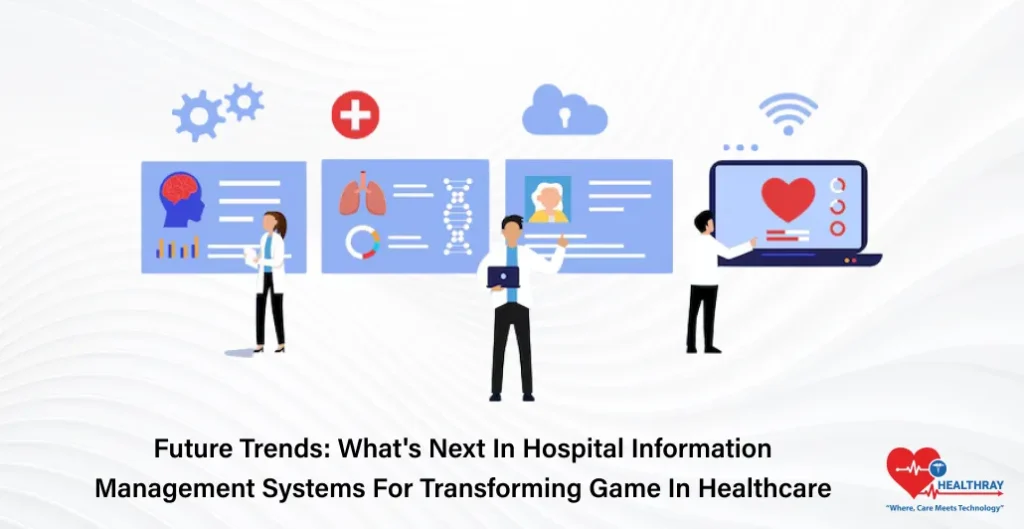
More recently, health-related applications of artificial intelligence have barely reached the tip of their full potential. As time and technology progress, the management of information in hospitals becomes increasingly smarter, more efficient, and all the more patient-centered. Here’s a look at some of the trends shaping the future of AI in healthcare.
Advanced Predictive Analytics
The future of health is hyper-personalized. In the future, AI systems will be able to predict-not just imminent risks, including infection-but long-term health trends of individual patients. This will enable hospitals to take preventive measures, while care plans can be developed in ways and with detail previously unimaginable.
Natural Language Processing for Better Communication
With NLP technology, there has been a revolution in how unstructured data are managed in a hospital setting, such as physician notes, summaries upon discharge, and patient feedback. AI will thus streamline workflows and improve both intra- and interdepartmental communications by understanding the information and then organizing it.
AI-Powered Virtual Assistants
Already, virtual assistants have started attracting consumers, and their roles are going to expand. Starting from answering patient queries in real time, AI assistants may also assist doctors during the consultation process. This will notably reduce the workload on hospital staff while increasing patient satisfaction.
AI with Blockchain for Data Security
AI combined with blockchain technology could thus offer an unprecedented level of security and transparency. It will enable the safe sharing of data by hospitals with parties interested in such data, hence creating opportunities for different health care providers to collaborate while ensuring data privacy.
Robotics in Healthcare Operations
AI-powered robots are expected to perform the repetitive tasks of supply transport, sanitization, or helping in minimally invasive surgery. This shall free up human resources for more critical tasks and bring efficiency into operation processes.
Real-time population health management
AI will be used in the future to handle and monitor population health trends in real-time. The gathered data will help identify the early signs of emerging public health crises, thus enabling timely and effective responses.
Ethical AI and transparent decision-making
With AI integration in health, increasing focus will be directed to creating systems that are fair, unbiased, and explainable. There will be close collaborations between hospitals and AI developers with the intent of ensuring equity in service to diverse patient needs.
AI in hospital information systems is the enabler of immense possibilities. Staying ahead of such trends means continued transformation for patient care and operational excellence within hospitals, eventually making everyone’s future healthier.
Conclusion
AI in healthcare is not a concept of the future; it’s the bitter reality that changes the way hospitals work and delivers care. From patient experience to workflows and data security, AI-powered Hospital Management Systems are transforming each cadre of healthcare management.
But successful implementation goes way beyond technology per se. It’s about strategic balance: innovation and the human touch, ethics, and inclusivity. That road to integrating AI for the hospital administrator, IT professional, and provider includes one of team and system preparation as much as an act of technology adoption.
While the journey is unlikely to be complete without its challenges, benefits cannot be ignored. The hospitals embracing AI will go on furthering care, enhancing resources, and securing an even stronger position as leaders within the ever-changing landscape of healthcare.
Now is the time to act. AI is transforming healthcare, and it is those who adapt to meet not only today’s demands but also prepare for tomorrow’s needs.
